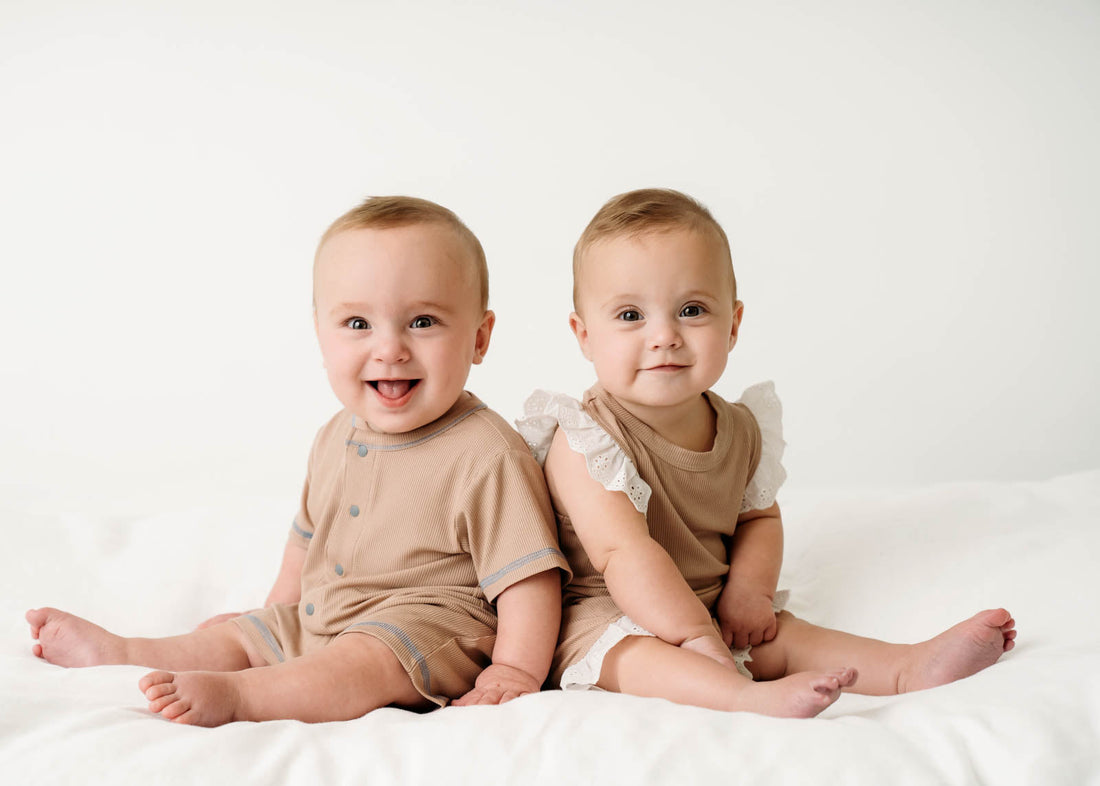If your bub has sensitive skin or eczema, you’ll know how quickly things can flare up — especially with the wrong clothing. At Rai and Co, we’re here to help you figure out which baby clothes are best (and worst) for delicate skin, plus give you a few handy care tips to keep your little one comfy all day and night.
The Right Clothes Should Be Soft And Breathable
When it comes to eczema-friendly clothes, comfort is key. The best fabrics are lightweight, soft, and breathable. Think cotton, bamboo, or silk — they let the skin breathe and reduce heat, sweat, and irritation.
Avoid anything rough, stiff, or tight. Those can trap heat and rub on sensitive spots, making eczema worse. Soft, natural fibres = happy skin.
How To Choose, Use, And Care For Clothes For Eczema-Prone Skin
1. Natural Fabrics Only...But No Wool
Choose gentle materials like organic cotton, or bamboo. They’re soft on bub’s skin and breathable. While wool is natural, it can be too rough — unless it’s superfine merino (and even then, test it first).
2. No Synthetic Fabrics
Steer clear of polyester, nylon and acrylic. They can trap sweat and make bub itchy. Even if they feel soft, they’re not breathable like natural fibres.
3. Avoid Turtlenecks And Tight Fits
Tight collars, cuffs or waistbands can rub or trap heat, especially around the neck and tummy. Go for loose, comfy fits instead.
4. Layer For Warmth
In cooler weather, layer with soft fabrics. Start with a cotton onesie, then pop a lightweight jumper on top. You can add or remove layers as needed.
5. Use Hypoallergenic Laundry Soap
Fragrance-free, dye-free laundry liquids are best. These are gentler on sensitive skin and help avoid flare-ups.
6. Dry Clothes Inside
Drying clothes outdoors can expose them to pollen or dust. If your baby is sensitive, try drying indoors or using the dryer on low heat.
7. Apply Emollient Before Dressing
Moisturise bub’s skin before getting them dressed — especially around the knees, elbows, and cheeks. This helps form a barrier between their skin and the fabric.
8. Reapply During Nappy Changes
Use nappy time to top up on moisturiser — it’s a great moment to keep their skin protected.
9. Wash Clothes Before First Wear
New clothes can carry dust or chemicals from packaging. Always wash them before bub wears them.
11. Avoid Itchy Tags
Tags can scratch and irritate. Choose tag-free clothing when you can, or snip them off carefully.
12. Watch Out For Chemicals Or Dyes
Stick to white or lightly coloured clothes made from organic cotton to avoid harsh dyes or finishes.
Keep Your Baby Comfortable All Night With Breathable Pajamas
Night-time can be tough for babies with eczema. Breathable, seamless pyjamas made from bamboo or organic cotton are perfect for keeping bub cool and comfy. Pair them with a good moisturiser at bedtime to help reduce overnight flare-ups.
Suggested Products
- Plain Waffle Romper – gentle and breathable for everyday wear
- Basic Leggings – great for overnight comfort
-
Baby Lightweight Eco Collection – eczema-friendly wardrobe staples
Suggested Blogs
FAQs
What’s the best fabric for babies with eczema?
Natural fabrics like cotton and bamboo. They’re soft, breathable, and gentle on the skin.
Can I use regular laundry detergent?
Best to go for a hypoallergenic option — fragrance-free and dye-free.
Should I wash new baby clothes before use?
Yes! Always wash before first wear to remove any dust, chemicals or residues.
Looking for baby clothes that are gentle on sensitive skin?
Check out our Basics Baby Bodysuits of soft, breathable daily essential wardrobes designed with your bub’s comfort in mind.





